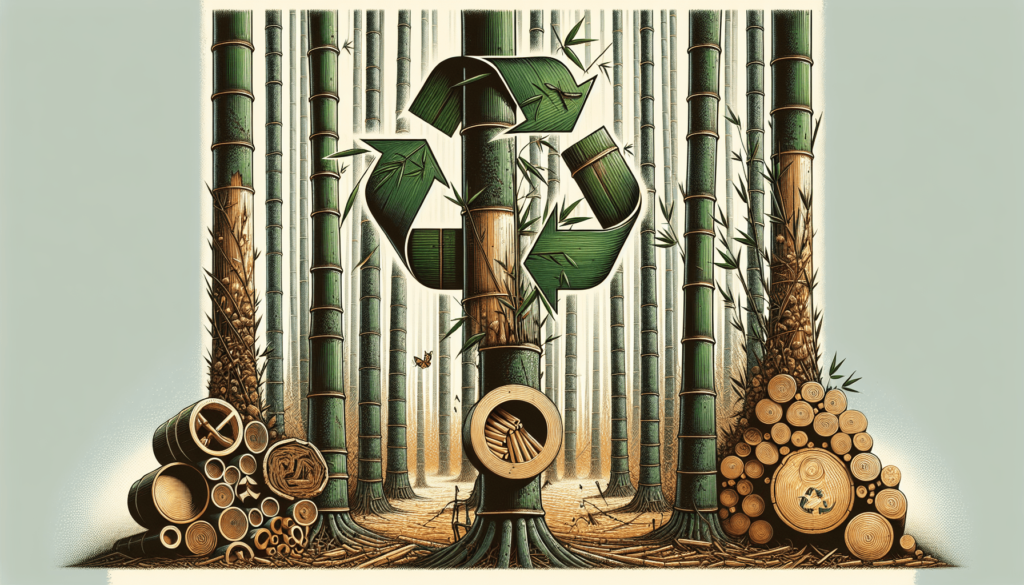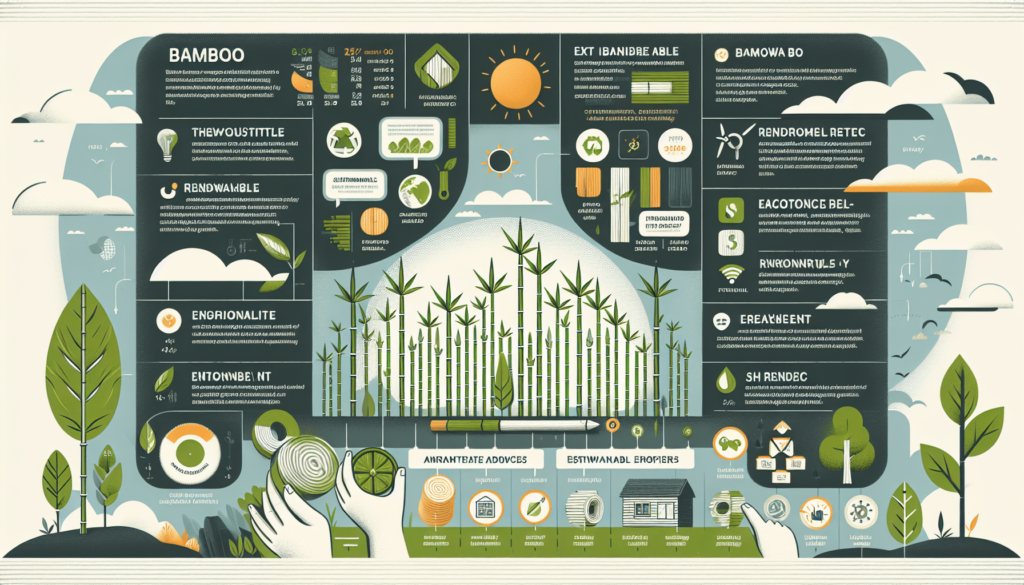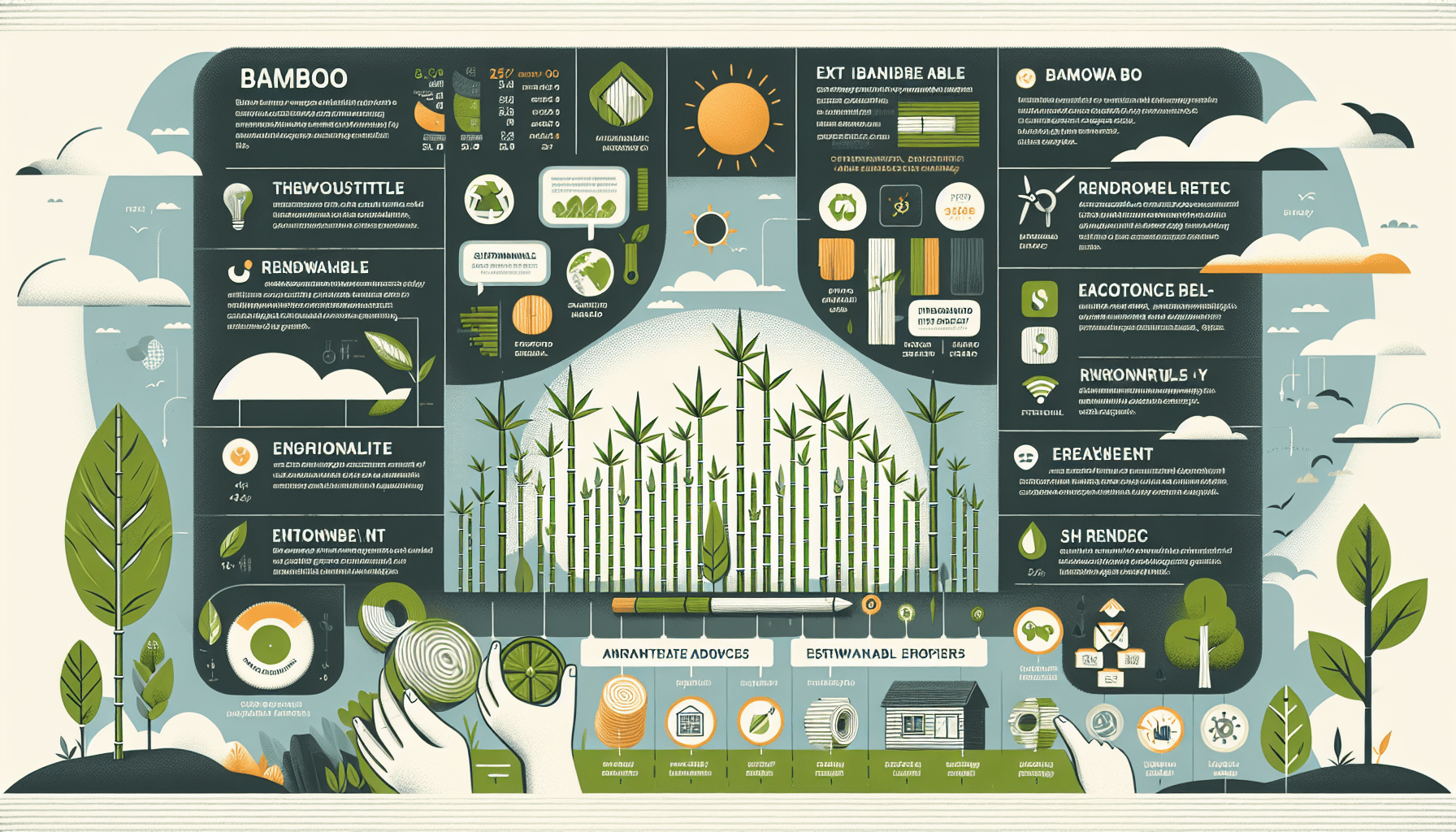Did you know that bamboo is not only used for pandas to munch on? In fact, bamboo is making a sustainable impact across various industries around the world. From fashion to furniture, this versatile and eco-friendly material is proving to be a game-changer. Not only does it grow rapidly, requiring no pesticides or fertilizers, but it also has incredible strength and durability. In this article, we will explore the numerous benefits of bamboo as a sustainable material and why it has become a popular choice for conscious consumers and environmentally-conscious businesses alike. So, let’s take a closer look at what makes bamboo so remarkable and how it is revolutionizing the way we think about sustainability.

Renewable Resource
Bamboo is considered a renewable resource due to its fast growth rate and ability to regenerate quickly. Unlike traditional hardwoods that take several decades to mature, bamboo can be harvested in just a few years. This rapid growth rate makes it an excellent alternative to slower-growing trees, reducing the pressure on natural forests and promoting sustainable resource management. In addition, bamboo plants have the unique ability to regenerate after being cut, eliminating the need to replant them every time they are harvested. This sustainable practice allows for continuous production without depleting the bamboo population.
Environmental Impact
One of the significant advantages of bamboo as a sustainable material is its low carbon footprint. Bamboo absorbs carbon dioxide and releases oxygen into the atmosphere, contributing to the fight against climate change. Compared to other building materials such as concrete, steel, or traditional wood, bamboo has a much lower carbon emissions output during its life cycle. Additionally, bamboo plantations act as a carbon sink, absorbing more greenhouse gases than most other plants. This natural carbon sequestration makes bamboo a valuable tool in mitigating global warming.
Furthermore, bamboo plays a crucial role in improving air quality. As a fast-growing plant, bamboo absorbs a significant amount of air pollutants, including harmful particulate matter and volatile organic compounds. By planting bamboo, you can help reduce air pollution and create a cleaner and healthier environment for yourself and future generations.
Versatility
Bamboo offers a wide range of applications, making it an incredibly versatile material. From construction to furniture-making, bamboo can be used in various industries. It can be processed into boards, beams, and flooring, providing a sustainable substitute for traditional hardwood. This versatility makes bamboo an excellent choice for eco-friendly builders and homeowners looking for sustainable alternatives to conventional materials.
Moreover, bamboo has gained popularity in the textile industry. The fibers extracted from bamboo can be spun into fabric that is soft, durable, and highly breathable. Bamboo textiles have excellent moisture-wicking properties, making them ideal for sportswear and bedding. Their natural antibacterial properties also help eliminate odors, making bamboo fabric a great choice for those with sensitive skin.
Strength and Durability
Despite its lightweight appearance, bamboo is incredibly strong and durable. In fact, it has a comparable strength to steel, making it an excellent choice for structural purposes. Bamboo’s tensile strength, combined with its natural flexibility, allows it to withstand heavy loads and resist bending or breaking.
Furthermore, bamboo exhibits excellent longevity. Unlike traditional wood, which can rot or decay over time, bamboo is highly resistant to moisture, warping, and rotting. This makes it an ideal material for outdoor applications, such as fences, decking, or garden furniture, where exposure to the elements is a concern. With proper maintenance, bamboo products can maintain their beauty and functionality for many years, reducing the need for replacements and further lowering waste accumulation.

Insect and Pest Resistance
One of the remarkable natural properties of bamboo is its resistance to insects and pests. Bamboo contains a natural antimicrobial agent called bamboo kun, which acts as a deterrent to insects and prevents infestations. This inherent resistance eliminates the need for chemical treatments or pesticides commonly used in other materials, promoting a healthier and safer living environment. Choosing bamboo for furniture, flooring, or other household items ensures that you won’t have to worry about damage caused by termites or other insects, saving you time, money, and potential headaches in the long run.
Water and Moisture Resistance
Another advantage of bamboo as a sustainable material is its exceptional resistance to water and moisture. Unlike traditional wood, which can warp or rot when exposed to humid conditions, bamboo maintains its shape and integrity. This characteristic makes bamboo an excellent choice for areas with high humidity or moisture, such as bathrooms or kitchens. Bamboo flooring, for example, can withstand the constant presence of water without warping or developing mold, ensuring its long-lasting beauty and functionality.
Biodegradability
Bamboo is a naturally biodegradable material, meaning it can break down and decompose over time without leaving harmful residues or contributing to landfill waste. When bamboo products reach the end of their life cycle, they can be discarded and will naturally decompose, reducing waste accumulation. This biodegradable quality makes bamboo a sustainable choice for those conscious of their environmental impact and looking to minimize waste.
Hypoallergenic Properties
For individuals with sensitive skin or allergies, bamboo offers a hypoallergenic alternative to synthetic materials. Bamboo fibers are naturally smooth and round, making them gentle and less likely to cause skin irritation. The fabric derived from bamboo also has excellent moisture-wicking properties, keeping the skin dry and reducing the chance of allergens or irritants accumulating. Choosing bamboo-based products, such as bedding or clothing, can provide comfort and peace of mind for those prone to allergies or skin sensitivities.
Aesthetic Appeal
Aside from its eco-friendly qualities, bamboo also boasts an elegant and natural aesthetic. The distinct look and texture of bamboo lend a touch of sophistication and uniqueness to any space. Whether used in flooring, furniture, or decorative items, bamboo adds a natural warmth and charm that complements a variety of interior styles. With different colors and textures available, including light or dark tones and smooth or textured finishes, bamboo offers endless possibilities to enhance the visual appeal of your living spaces.
Affordability and Accessibility
Contrary to popular belief, sustainability doesn’t always come with a hefty price tag. Bamboo is an affordable material compared to many alternatives on the market. Its fast growth rate and ease of cultivation contribute to its affordability, making it accessible to a wide range of consumers. Additionally, bamboo is grown and harvested in various regions around the world, making it readily available and reducing transportation costs. Choosing bamboo as a sustainable material allows you to create an eco-friendly living environment without breaking the bank.
In conclusion, bamboo is a remarkable and sustainable material with numerous benefits. Its renewable nature, low environmental impact, and versatility make it an ideal choice for various applications. From construction to textiles, bamboo offers strength, durability, and resistance to pests, water, and moisture. Its biodegradability and hypoallergenic properties further contribute to its appeal as a sustainable material. Moreover, bamboo’s aesthetic appeal, affordability, and accessibility make it a practical and environmentally-friendly choice for those looking to embrace sustainable living. By opting for bamboo products, you can contribute to a greener and healthier planet while enjoying the many advantages this remarkable material has to offer.

